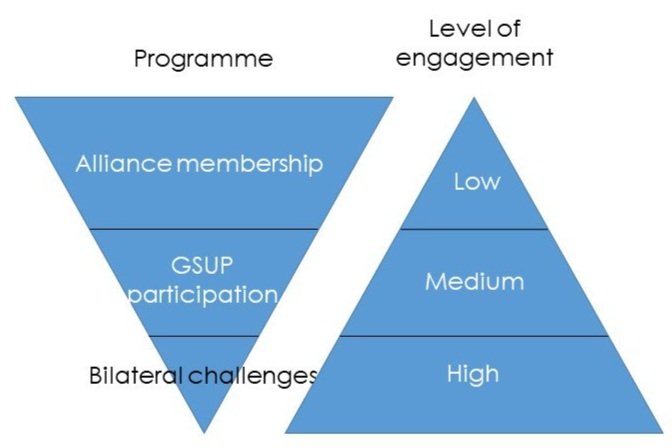
The GovTech Global Alliance is a network of international partners from government, academia, and the private sector working across borders to improve and promote innovation in the public sector.
Welcome to the GovTech Global Alliance!
The GovTech Global Alliance's mission is straightforward: it exists to share best practices among its international network on how to deliver government transformation and find solutions to some of the world’s problems through technology and innovation.
Read more to find out how to get involved in this award-winning internationally recognised network.
Formed in Scotland in 2020 as The CivTech Alliance with members stretching from Washington D.C. to South Australia, it was set up as an in-depth resource for practitioners and academics in the Civic and GovTech space. In July 2023 it was rebranded as GovTech Global Alliance.
Ways to engage and benefits of participation
For Programme teams
People join the GovTech Global Alliance because the challenge of progressing government is not an easy one. Many of our members are at the vanguard of public sector and civic innovation as they push the boundaries in working practices and cross-sector collaboration.
There are three increasing levels of engagement:
The weekly video meetings
Global Scale-Up Participation
Bilateral challenges
Weekly video meetings
Our weekly video calls started as pandemic lockdowns were implemented, where we shared our respective governments’ response to the pandemic and our role within that. These have led on to Ministerial participation in subsequent GovTech Summits and Demo Days. We continue to run calls taking into account different time zones and alternating every fortnight:
Wednesdays 3pm BST - US/South America/EUR/ME
Thursdays 8am BST - EUR/ME/Australia/NZ
These calls are an opportunity to update the teams on latest developments and run for 75minutes. These are deliberately scheduled fortnightly so you have a chance to get to know the other members - from knowledge, comes trust, which leads to opportunities but also friendships! For some, these calls are about sharing best practice, for others they are ‘therapy sessions’ for those trying to change government!
The Global Scale-Up Programme (GSUP)
The purpose of the Global Scale-Up Programme (GSUP) is to source, surface and scale climatetech solutions for global public sector applications. GSUP brings participating Alliance members together on a global forum to help climatetech companies from around the world access markets within the membership. This is done through a series of engagement sessions where companies meet key stakeholders (policy makers, procurers, investors and innovators) within each of the regions. Run from September to November, the programme culminates in a demo day at that year’s UNFCCC COP.
The aim of the programme is three-fold:
Help companies to understand how to sell to the public sector in different countries around the world
Provide the global platform through access to COP28
Emphasise diversity, ethics and social impact in product and business development
In 2021 and 2022, the Alliance put together two cycles of this ground-breaking programme in COP26 in Glasgow and COP27 in Sharm El Sheik. Alliance programme teams across 12 countries (US, Brazil, Australia, Ireland, Greece, Lithuania, Estonia, Poland, Denmark, Germany, Spain & Scotland) brought together key stakeholders from within their regional ecosystems to provide a platform for selected 30 climatetech entrepreneurs to access policy makers, procurers and investors in the two months preceding the COPs.
Bilateral challenges
Many of our members run challenge-based programmes. The natural evolution of the challenge process is to broaden the challenge across borders. The complex societal and environmental issues that we all face require a global response. A bilateral challenge involves two counterpart agencies (e.g. two Environment Agencies) to work together on a shared challenge area that meets shared policy priorities and supports economic development through harnessing the innovative solutions of regional companies.
This approach enables governments to open up to innovation networks they wouldn’t otherwise have access to, and work together far more closely than they have been able to previously, because of the in-house Innovation Teams. Arguably, one of the best ways of improving domestic policy outcomes is to understand how other governments have achieved theirs. It enables closer collaboration at central government, agency, business and community levels. And as such, is an enabler of innovation diplomacy.
This is at the thin end of the wedge - an in-depth engagement, running parallel challenge-based procurements. We would expect the following outcomes from a bilateral challenge process:
To develop closer governmental relationships through:
Collaboration on shared policy/service delivery challenges;
Improved inter-agency collaboration;
Commitment to a match-funded process;
Transference of knowledge and expertise in innovation processes;
Transference of knowledge and expertise in policy areas;
Greater understanding of governmental innovation processes through exposure to each other’s markets, organisations, and methodologies;


